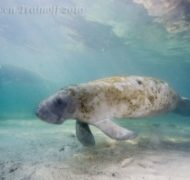Manatees and the Gator Aggravator
Blog / Produced by The High Calling
We moved to Crystal River, Florida, when I turned twelve. We were poor and running but Mom kept her head on straight and gave us room to thrive as best as she could.
I quickly discovered the water, living as we did a hundred yards from streams and marshes that within a quarter of a mile connected to the Crystal River itself. We’d frequent its shoreline beaches and famous springs and occasionally go boating with friends or fellow church members. Drifting across the intersection of inlets and outlets and jumping from the bow of a pontoon boat into hot Florida sun and bone-cold spring-fed water bring back good memories. What a marvelous place to frolic when you live in government housing.
Those were my middle school years and play wasn’t always mother-approved. I palled around with kids who shot cats with BB guns and used alligators as target practice with stray golf balls we’d find in the woods along fairways 17 and 18. The surrounding natural environment was amazing but it didn’t elicit much care from me. I took more pleasure from it than in it.
Florida connection
These memories came to mind recently when I read about a couple of scientists who studied manatees in the 90s – soon after our stint in Florida. They wondered why so many “sea cows” get sliced by boat propellers. I knew what they meant. The Crystal River is, after all, the world’s manatee central and I’ve seen the creatures and their scars up close. In 2009 alone, for instance, 97 died from boat strikes. And many of the nearly 4,000 manatees in the wild have deep and ugly gouges along their backs from one or more close calls.
The scientists, Dr. Edmund Gerstein and his wife Laura, were “the first to train manatees for psychoacoustic testing.” In 1991, they set up camp in a tiny trailer in the Lowry Park Zoo and lived there for years, training the test subjects and collecting thousands of data samples. Their hypothesis was that manatees weren’t too slow or dumb, as was previously assumed, but too hard of hearing. You can watch a brief video here demonstrating a bit of their work.
“The results of their research demonstrate that manatees cannot effectively hear and locate the dominant low-frequency sounds produced by many approaching boats until they are too close to avoid injury.”
So while I was living in a Florida trailer aggravating gators and torching ant colonies, the Gersteins were getting ready to live in their own Florida trailer where they could feed monkey chow to sea cows and learn how to protect them from harm.
Growing up...
Our culture is somewhere in the middle of an environmental awakening and by the grace of God I got to mature into it. Family situations and immaturity hampered my concern for God's creatures as a young teen, even as I may have swum in the same waters as the Gersteins. Yet today I teach our kids to pick up “roly-poly” bugs without crushing them and I hold an educator card with the Leave No Trace program. What sparks me deeply as an adult is exploring the scope of God’s call to be a steward of all things, from bugs to buildings and from manatees to manufacturing.
Being in the middle of an awakening, of course, implies an end. I believe we’ll move on in the next ten or twenty years. Sierra Clubs and Gersteins will remain but the spot light on environmental stewardship will fade.
...and moving on?
The important question is What will remain? Will this movement we’re passing through leave a philosophical and – more importantly for the Church – theological mark? Will we hold on to God’s care for the created order which he called good and allow that recurring message in the Scriptures to inform the way we live? Will it continue to educate kids like me?
I’m happy for this recent ecological connection to my past. I was unaware on the front end of the movement and will likely see it go but the invitation to care will remain for us. However slowly or radically, and regardless of shifting cultural interests, you and I will continue to be invited into a bigger vision. Yours may be to care for manatees or middle-schoolers but probably some broader variation of both, for the great commandments call us to consider all things.
We don’t have the capacity to fix all things, but collectively we respond – like the Gersteins, like Mom – as best as we can.
Further reading on:
Dr. Gerstein's study reflections
Photo by drsteve. Used with permission. Post by Sam Van Eman.





